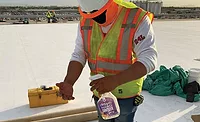Surveys Suggest Strain of COVID-19 Crisis Taking its Toll, but Roofers Remain Resilient

Workers with Rackley Roofing in Nashville keep their spirits up while working safely during the COVID-19 pandemic. Photo courtesy of Rackley Roofing.
Results from surveys of the industry seem to indicate roofing contractors are feeling the strain of the enduring COVID-19 crisis, but haven’t lost confidence that they’ll weather the storm.
Roofers around the nation continue to struggle with “essential business” designations, shelter-in-place orders and implementing policies to keep customers and workers healthy. The National Roofing Contractors Association (NRCA) has continued to conduct surveys of its members to gain an idea of how the industry is coping with these restrictions during the pandemic.
In addition to the NRCA’s survey, Clear Seas Research — the survey and research arm of RC’s parent company, BNP Media — conducted a survey from April 2-6 of professionals across several industries that coincide with the NRCA’s findings.
According to the April 9 NRCA survey, 40% of contractors say they’re experiencing “significant” and “steadily increasing” effects on their business due to the pandemic, while 33% say it’s noticeable but not significant. Compare this to the NRCA’s March 28 survey that shows 44% are feeling significant effects and 34% said it’s noticeable.
This slight dip could be due to the fact that more contractors are able to work despite shelter-in-place orders. The NRCA survey shows 38% of respondents have current or scheduled projects for essential operations like hospitals and extended care facilities, proving that roofing is an essential business.
“It sounds like the industry is actually working the way it’s been designed to do, and roofing companies, as they’ve always done, are putting their customers first, and as essential business, they’re getting out there and getting the work done in what it sounds like in a safe fashion,” said NRCA CEO Reid Ribble during a Telephone Town Hall held April 14.
Clear Seas Research shows that, compared to a year ago, 68% of respondents have seen a decline in new business. That same percentage expressed a decline in business spending on equipment, products and technology.
Economic Woes
Those who responded to the April 9 survey said the top problems they’re facing consist of reduced customer demand for commercial roofing services, job cancellations and increased employee absences.
The Clear Seas Research survey confirms economic woes remain top of mind. Contractors made up the majority of the respondents, and they ranked their top three concerns as: the current economy; worries over family and friends becoming infected; and achieving business goals over the next three months. Between the end of March and the beginning of April, concerns over the economy rose from 69% to 75%.
These worries are justifiable considering the loss of sales that contractors are facing. The NRCA survey revealed that a quarter of its respondents are expecting a 20% reduction in sales volumes over the next three to six months. Another 21% said they expect a decrease of 30%.
“It is harder to sell a roof right now when you’re not face-to-face with somebody,” said Pat Nussbeck, president and CEO of Aspen Contracting in Georgia. “It’s harder to ask somebody for referrals and generate more business that we’re doing, and in some of the states roofing isn’t essential and some of them are, so you really have to sell like no other.”
The strain caused by the lack of business has taken its toll. At the end of March, 62% of contractors expressed it would take less than a month to get back to “business as usual” if the COVID-19 pandemic ended today. In the most recent NRCA survey, that percentage decreased to 39%.
Roofing contractors are taking advantage of the Coronavirus Aid, Relief and Economic Security (CARES) Act to deal with lost revenue. Almost 80% of respondents said they are or have attempted to use provisions from the CARES Act. Of them, the vast majority (79%) are using the Paycheck Protection Program to help maintain their payrolls.
The Clear Seas Research data showed that 59% of respondents saw a decline in their budget, and 31% expressed they are applying for a loan provided by the CARES Act.
Unfortunately, applying for these loans has not been easy. Of those who have applied, 38% of NRCA respondents said they’ve had difficulties applying for the Paycheck Protection Program. Comments about applying for the loan ranged from having “no issues” to being frustrated with the process.
“Have spent almost two weeks trying to apply for this and still trying to get the paperwork processed,” one survey subject wrote.
Continued Confidence
Despite these hardships, the strain hasn’t diminished the resiliency of roofing professionals. When the NRCA asked how contractors feel about the future of their business, 37% said in March they feel “very confident” while 56% expressed they were only “somewhat” confident. In April, those numbers fluctuated to 39% and 54%, respectively.
This confidence is perhaps best expressed by the number of contractors adopting new techniques and technology to navigate a nation practicing social distancing. Clear Seas Research data shows the usage of video chat and conferencing platforms like Zoom to communicate with customers is up to 41%, which is roughly on par with text messaging. Similarly, platforms like Slack and Hangouts are at 25% for mass communication purposes.
“I think the rest of the industry knew, maybe it was two years from now or five years from now, that the homeowner was changing and they were going to demand a virtual sales type of experience,” said Piers Dormeyer, senior vice president of construction sales at EagleView Technologies. “We found that our contractors that have been ahead of the curve and started to embrace the new homeowner experience are actually growing.”
Respondents also ranked the activities that they’ve focused on relative to six months ago. Aside from implementing additional health and safety procedures, the top items included reading more industry publications, investing in new technologies and attending more webinars.
“Now’s a great time to be evaluating other tools for your business and really think about, while you’re chained to your desk and have this time, to evaluate certain things and model out your spending and tweak your business plan — now’s a great time to look at all sorts of solutions,” Dormeyer said.
Looking for a reprint of this article?
From high-res PDFs to custom plaques, order your copy today!







